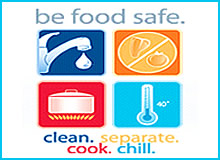Everyone who runs a food business needs to make sure they follow good food hygiene practices to ensure that the food they handle or serve is safe to eat. Food should always be of the nature, substance or quality that your customers would expect. Serving food which is both safe and of sufficient quality will also help to protect your business’s reputation.
This guide informs you about food hygiene, outlining why it’s important and what your responsibilities are.
Food hygiene and the law
Before you start a new catering or other food business, or before starting to use new establishments, you must register all of your establishments with the environmental health service (EHS) at your local council. You must do this at least 28 days before you start trading.
You may also need to have your establishments approved if you supply another business with:
- meat and meat products
- eggs
- milk and dairy products
- fish and fish products
For information on how to register a business, contact the EHS in your local council. Find your local council using our Contacts Directory
The EHS will also be able to advise you about how the law applies to your business in practice.
Your establishments will be inspected by enforcement officers from your local council to make sure you are complying with the law. You will not usually be given notice of an inspection.
When they think it is necessary, inspectors can take enforcement action to protect the public, including:
- serving a hygiene improvement notice if you are breaking the law, which sets out certain things you must do to comply
- serving a hygiene emergency prohibition notice which forbids the use of establishments or equipment
- recommending a prosecution, in serious cases
Food hygiene regulations set out the basic hygiene requirements for all aspects of your business and require you to make sure that:
- your establishments meet hygiene standards
- staff follow good personal hygiene practice
- food safety problems are identified and controlled as part of your food safety management procedure
- staff receive adequate instruction and/or training in food hygiene, and are supervised
- food is kept at a safe temperature
- you keep written records of how you manage food safety hazards
You should be aware that food businesses – except farmers – are required to put in place food safety management procedures based on the principles of HACCP (hazard analysis critical control point). In practice, this means that you must have documented procedures in place to manage food safety hazards in your business.




